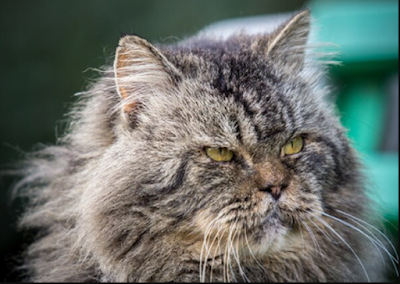Signs of Common Health Problems in Older Cats

7 Common Health Problems in Older Cats
1. Arthritis
According to feline veterinary specialist , studies have shown that 90 percent of cats over 12 years of age are likely to have radiographic signs of arthritis. If your cat no longer wants to go up or down stairs or jump on or off furniture, has difficulty grooming himself, because it’s difficult for him to climb inside, or seems stiff after standing up, arthritis may be the reason. If you notice any of these signs, talk to your veterinarian about ways to help relieve your cat's pain.
2. Cancer
Thirty percent of all cats over age 10 will be diagnosed with some form of cancer, according to , assistant professor of oncology at the . One of the most common types of cancer seen in cats is . Take your cat to the vet immediately if you notice any of these : appetite loss or unintentional weight loss; lumps or bumps that increase in size, sores that don’t heal, or bleeding or other discharge from the mouth, nose or anus; unusual body odor, lack of energy, difficulty eating or swallowing, unexplained lameness that doesn’t improve; or difficulty breathing, urinating or defecating.
3. Dental Disease
Is your cat having trouble chewing — or picking up his food and then dropping it? He may have painful periodontal disease, a common problem in aging cats. Plaque and tartar can build up heavily over the years, especially if teeth aren’t on a regular basis. Schedule a thorough cleaning, and then follow up by every day to help keep them clean. Keeping teeth and gums clean is an important part of maintaining your cat’s good health.
4. Failing Vision
Cataracts, glaucoma and retinal detachment are among the that can affect older cats. Look for signs such as cloudiness or whiteness of the lens, general cloudiness of the eye, dilated pupils or, of course, bumping into things. Medication can help, depending on the type and severity of the problem. Cataracts can be removed surgically, but cats typically get around so well using their sense of smell that it’s often not necessary. Just remember not to move the furniture around, or he might bonk his head.
5. Hearing Loss
Even for cats, the sense of hearing begins to go with age; it’s just a fact of life. You can’t purchase hearing aids for your cat — yet — but you can still communicate with him. Teach hand signals, stomp your foot, so he feels the vibrations and knows you are nearby, or use the time-honored method of going to him to alert him that it’s dinnertime. He’ll appreciate it.
6. Hyperthyroidism
Though it may seem like a good thing, an excessive appetite and increase in energy could be clues that your senior cat may have developed , a condition in which the thyroid gland produces far greater levels of thyroid hormone than necessary. Cats with hyperthyroidism are also prone to , which can contribute to kidney failure or heart disease if the condition goes untreated. If you suspect your cat may have developed hyperthyroidism, schedule a visit with your veterinarian for blood work and to discuss treatment options.
7. Kidney Disease
Kidney failure is one of the most common problems veterinarians see in senior . Regular geriatric exams, starting early in your cat’s golden years, can increase the likelihood of early detection and proper management of any deteriorating kidney function. Though isn’t reversible, in many cases, a therapeutic diet, , and sometimes medication and certain supplements can help to manage the condition and add months or years to your cat’s life.
